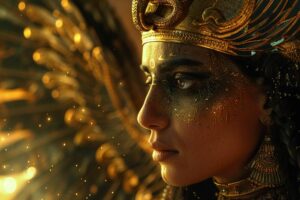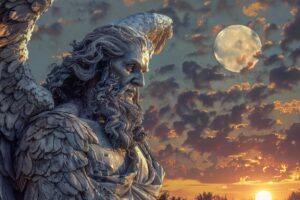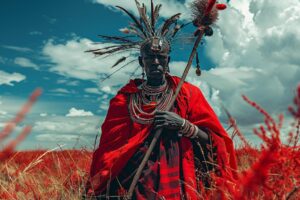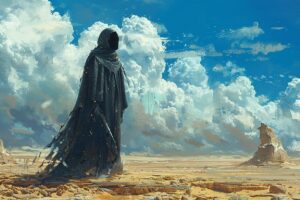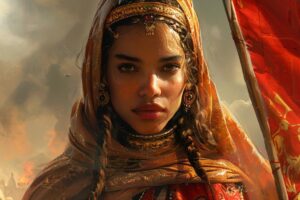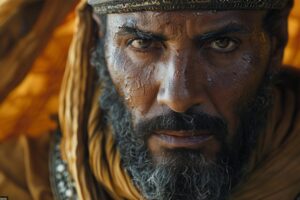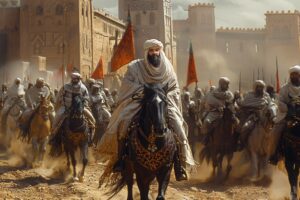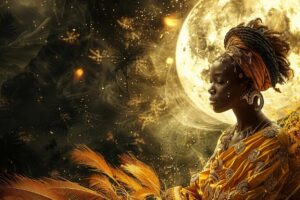Maasai Mythology: Stories and Beliefs of the Maasai People
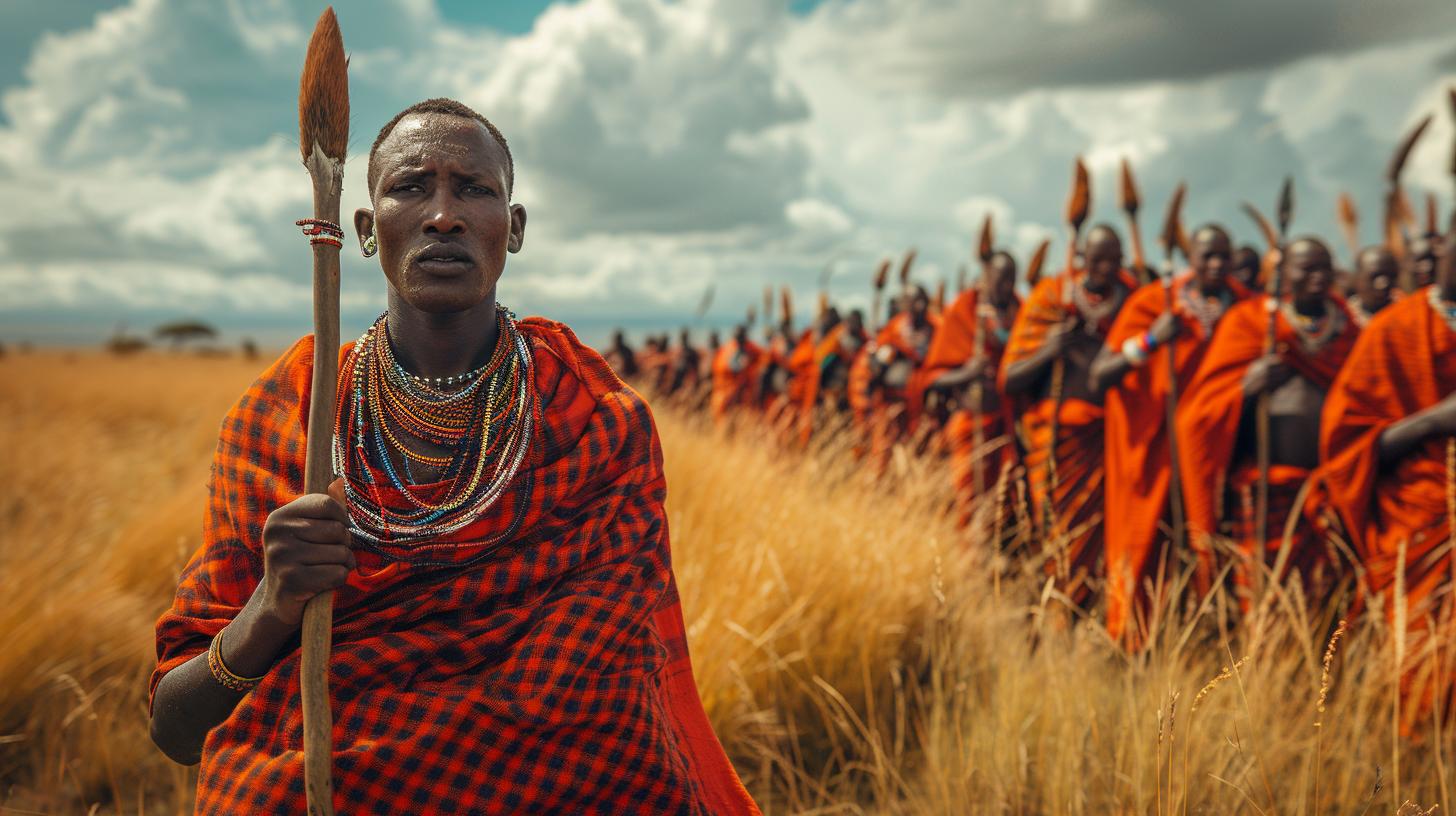
The mythology of the Maasai people is rooted in their deep connection with nature and their belief in Enkai, the Supreme Creator. The Laiboni play a crucial role as spiritual leaders and healers within the Maasai community.
Legends such as Olenana and the descent of the Maasai people reflect the rich oral tradition of Maasai mythology.
Background of Maasai Culture
The Maasai people have a rich cultural heritage that is deeply intertwined with their history, society, and oral literature.
Maasai People and Their History
The Maasai are a Nilotic ethnic group primarily inhabiting Kenya and Tanzania, known for their distinctive customs and pastoral way of life. Their history is steeped in traditions of warriorhood and nomadic existence.
Maasai Society and Traditions
Maasai society is structured around age-sets, with individuals progressing through different life stages marked by specific responsibilities and privileges. Traditional customs, such as cattle herding and beadwork, play a central role in Maasai daily life.
Maasai Oral Literature
Oral literature is a vital aspect of Maasai culture, with storytelling serving as a means of passing down historical accounts, moral lessons, and mythical stories from generation to generation. Through their oral traditions, the Maasai preserve their collective wisdom and beliefs.
Maasai Mythology and Beliefs
The Maasai people’s traditional beliefs revolve around their unique mythology, which shapes their worldview and spiritual practices. In this section, we delve into the core aspects of Maasai mythology and the significance it holds within their culture.
Enkai: The Supreme Creator
Enkai, also known as Ngai, plays a central role in Maasai mythology as the Supreme Creator. Enkai embodies both masculine and feminine principles, reflecting the balance and harmony present in nature.
The Maasai revere Enkai as the force behind creation and the source of all life.
Nature in Maasai Beliefs
Nature holds great importance in Maasai beliefs, serving as a tangible connection to the divine. The Maasai view the natural world as sacred and imbued with spiritual significance. They believe that the elements of nature reflect the presence and power of Enkai.
Importance of Deities in Maasai Mythology
Deities and spirits play a vital role in Maasai mythology, representing various manifestations of Enkai’s power. These divine entities are thought to influence human affairs, from governing natural phenomena to guiding personal destinies.
The Maasai approach these deities with reverence and seek their favor through rituals and offerings.
The Role of Laiboni in Maasai Religion
In Maasai religion, the Laiboni play a crucial role as intermediaries between the community and the spiritual realm. They hold immense spiritual authority and are revered for their connection to the Creator, Enkai.
The Laiboni are responsible for interpreting signs and messages from the divine, guiding the Maasai people in matters of faith and tradition.
Laibon as Intermediaries
As intermediaries, the Laiboni act as communicators between the Maasai people and the spiritual forces of Enkai. They perform rituals, offer sacrifices, and seek divine guidance on behalf of the community.
The Laiboni possess deep spiritual knowledge and are tasked with maintaining harmony between the physical and spiritual worlds.
Healing Practices of the Laibon
The Laiboni also serve as healers, addressing both physical and spiritual ailments within the community. Through traditional practices and ceremonies, they undertake healing rituals to restore balance and well-being. The Laiboni use a combination of herbal remedies, spiritual chants, and divination techniques to diagnose and treat illnesses, believing that physical wellness is intertwined with spiritual harmony.
Legends and Stories in Maasai Mythology
The Maasai people have a rich tradition of legends and stories that are passed down through generations. These tales offer insights into the cultural beliefs and values of the Maasai community.
Olenana: The Trickster in Maasai Lore
Olenana is a prominent figure in Maasai mythology, known for his cunning and ability to outsmart others. His stories serve as cautionary tales, teaching important lessons about deceit, consequences, and wisdom.
Descent of the Maasai People
According to Maasai mythology, the Maasai people descended to earth by sliding down a rope that connected the heavens to the earth. This origin story reflects the deep spiritual connection the Maasai have with the divine and the natural world.
Rituals and Ceremonies in Maasai Culture
Rituals and ceremonies hold significant importance in Maasai culture, serving as ways to connect with the spiritual realm and honor traditional beliefs.
Spiritual Practices in Maasai Community
- Participation in communal prayers and offerings
- Use of sacred herbs and plants in ceremonies
- Observance of specific rituals during significant life events
Role of Oloiboni in Rituals
The Oloiboni play a crucial role in leading and officiating various rituals and ceremonies within the Maasai community, guiding individuals through spiritual practices and offering blessings for important occasions.
Maasai Cosmology and Worldview
The Maasai people have a deep connection with nature and their environment, viewing it as a reflection of their spiritual beliefs and cultural identity.
Connection with Nature and Environment
In Maasai culture, the natural world is intricately linked to their cosmology and worldview. Here are some key points:
- Nature is revered for its beauty and significance in Maasai spiritual beliefs.
- The Maasai view the land as a sacred entity that sustains their livelihood and cultural practices.
- Animals, plants, and natural landmarks hold symbolic meaning in Maasai cosmology.
Spiritual Beliefs in Maasai Culture
Maasai spiritual beliefs are deeply intertwined with their cosmology and worldview, shaping their ethical values and sense of community.
Here are some aspects to consider:
- Enkai, the Supreme Creator, is central to Maasai spiritual beliefs, embodying both masculine and feminine principles.
- Rituals and ceremonies in Maasai culture often involve connecting with the divine through nature and natural elements.
- The Maasai believe in a spiritual interconnectedness with the environment, emphasizing the balance between humans, animals, and the land.
Transmission of Maasai Mythology
The transmission of Maasai mythology plays a crucial role in preserving the cultural heritage and identity of the Maasai people.
Through the oral tradition, mythological tales are passed down from generation to generation, ensuring the continuity of traditional knowledge and beliefs.
Oral Tradition in Preserving Mythological Tales
- Oral storytelling has been the primary method of transmitting Maasai mythology for centuries.
- Elders and storytellers are responsible for sharing the rich tapestry of myths and legends with younger members of the community.
- Through poetic language and vivid imagery, the stories are ingrained in the collective memory of the Maasai people.
Importance of Mythology in Maasai Identity
Mythology is intricately woven into the fabric of Maasai identity, shaping their worldview and cultural practices.
It serves as a repository of wisdom, guiding principles, and historical narratives that define the collective consciousness of the community.
Significance of Mythological Tales
- Mythological tales provide insights into the origin of the Maasai people and their connection to the divine world.
- They offer moral lessons, ethical codes, and explanations for natural phenomena, fostering a sense of unity and cohesion within the community.
Contemporary Relevance of Maasai Mythology
The modern context has brought to light the importance of preserving Maasai cultural heritage amidst the rapid changes seen in society.
The myths and stories that have been passed down generations serve as a significant link to the past, offering insights into the beliefs and values of the Maasai people.
Preservation of Maasai Cultural Heritage
- The preservation of Maasai cultural heritage plays a crucial role in maintaining the identity and traditions of the community.
- Efforts are being made to document and safeguard the oral traditions and mythological tales of the Maasai people to ensure their legacy continues.
- Cultural institutions and organizations are working closely with Maasai elders to protect and promote their rich mythological heritage.
Impact of Modernization on Maasai Beliefs
- As modernization seeps into Maasai society, there is a noticeable shift in the way traditional beliefs and mythologies are perceived.
- The influence of external factors and global trends has begun to challenge the authenticity and relevance of Maasai mythological tales.
- The younger generation faces the dilemma of balancing traditional values with the realities of a changing world, leading to a potential dilution of Maasai mythological significance.
Comparative Analysis of Maasai Mythology
Exploring the connections between Maasai mythology and other African belief systems can reveal both shared themes and unique characteristics.
Similarities with Other African Mythological Systems
- Many African mythologies, including Maasai, highlight the significance of nature and the spiritual world.
- Common motifs such as creation stories, ancestral reverence, and divine intervention can be found across various African cultures.
- The emphasis on oral transmission and preservation of mythological tales is a shared trait among African communities.
Unique Aspects of Maasai Mythology
- Maasai mythology distinguishes itself through the figure of Enkai, a dual-gendered Supreme Creator with both masculine and feminine qualities.
- The central role of Laiboni as spiritual intermediaries and healers sets Maasai mythology apart from other African belief systems.
- Legends such as Olenana and the origin story of the Maasai people bring an individualistic flavor to Maasai folklore.
Interpretation and Scholarship on Maasai Mythology
The interpretation and scholarly analysis of Maasai mythology offer valuable insights into the cultural and spiritual significance of these narratives.
Academic research delves into the intricate layers of meaning embedded within Maasai myths, shedding light on their relevance in contemporary society.
Academic Study of Maasai Mythology
Academic scholars have dedicated extensive efforts to studying Maasai mythology, seeking to interpret its symbols and themes. Through rigorous academic inquiry, researchers aim to uncover the underlying messages and cultural nuances present in Maasai mythological tales.
Maasai Mythology in Popular Culture
The portrayal of Maasai mythology in popular culture reflects the enduring fascination with indigenous belief systems. In various forms of media, elements of Maasai myths are reimagined and repurposed, highlighting their enduring appeal and adaptability in contemporary narratives.
Evolution of Maasai Mythology
The evolution of Maasai mythology has been a dynamic process that reflects changes and adaptations over time while also retaining core mythological elements.
Changes and Adaptations Over Time
- Maasai mythology has evolved in response to historical events, cultural shifts, and external influences.
- New myths and legends have emerged to address contemporary issues and challenges faced by the Maasai people.
- Globalization and modernization have led to the incorporation of new elements into Maasai mythology.
Persistence of Core Mythological Elements
- Despite changes, certain key elements of Maasai mythology have remained consistent throughout generations.
- The belief in Enkai as the Supreme Creator and the reverence for nature continue to form the foundation of Maasai spiritual practices.
- Myths surrounding ancestral origins and the role of Laiboni as intermediaries between the Maasai people and the divine remain central to Maasai cultural identity.
Challenges in Preserving Maasai Mythology
Threats to Traditional Knowledge
One of the main challenges in preserving Maasai mythology lies in the threats to traditional knowledge.
As modernization and external influences continue to encroach upon Maasai lands, the transmission of oral traditions faces the risk of dilution and distortion. The rapid pace of societal change and the erosion of traditional practices pose a significant threat to the preservation of Maasai mythology.
Efforts in Safeguarding Maasai Cultural Heritage
To counteract the threats facing Maasai mythology, efforts are being made to safeguard the cultural heritage of the Maasai people. Various organizations and initiatives are working to document and record oral traditions, myths, and stories for future generations.
Collaborative projects between Maasai communities and researchers aim to preserve and promote the rich tapestry of Maasai mythology, ensuring its survival in the face of modern challenges.
Future Prospects of Maasai Mythology
Role of Maasai Mythology in Contemporary Society
The role of Maasai mythology in contemporary society is crucial for preserving the cultural heritage and spiritual beliefs of the Maasai people.
As the world modernizes, there is a growing need to protect and promote the significance of these mythological tales in order to maintain the unique identity and traditions of the Maasai community.
Continuing Relevance of Mythological Tales
The mythological tales of the Maasai hold timeless wisdom and cultural insights that continue to resonate with present generations. These stories serve as a bridge between the past and the future, offering valuable lessons on the interconnectedness of humanity, nature, and the divine.
By embracing and sharing these myths, the Maasai can ensure the preservation of their rich heritage for years to come.
.











